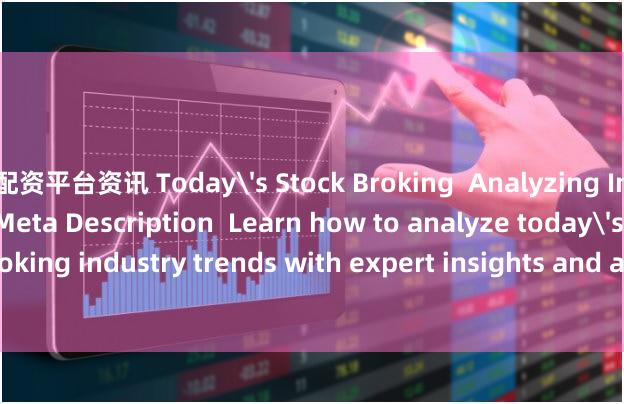
Today's Stock Broking: Analyzing Industry Trends (SEO Meta Description: Learn how to analyze today's stock broking industry trends with expert insights and actionable strategies for success.)
Lights, Camera, Action! The Stock Broking Scene is Heating Up!
Forget stuffy financial jargon for a second. Let's talk about the wild ride that is today's stock broking industry. It's not your grandpappy's brokerage anymore! We're talking lightning-fast technological advancements, a globalized marketplace shifting faster than you can say "bull market," and a whole new generation of investors armed with smartphones and insatiable appetites for growth. This isn't just about buying and selling shares; it’s about navigating a complex ecosystem of algorithms, regulations, and rapidly evolving investor behavior. Think of it like this: the playing field is constantly changing, and staying ahead means understanding the nuances of the game—not just the rules, but the strategies employed by both seasoned players and newcomers alike. We're talking about identifying those lucrative opportunities, managing risk like a seasoned pro, and ultimately, maximizing your returns. This isn’t just about numbers; it’s about understanding the human element driving market fluctuations, anticipating the next big trend, and, most importantly, making smart, informed decisions. This article dives deep into the current trends shaping the stock broking landscape, offering practical advice and insightful perspectives gleaned from years of experience in this dynamic field. Prepare to sharpen your analytical skills and gain the edge you need to thrive in this exciting, ever-evolving industry. Buckle up; it's going to be a thrilling ride!
Today's Stock Broking: Analyzing Industry Trends
The stock broking industry is undergoing a seismic shift, driven by technological innovation, regulatory changes, and evolving investor preferences. Understanding these trends is crucial for both established firms and aspiring brokers. Let's dissect the key factors shaping this dynamic landscape:
1. The Rise of Fintech and Algorithmic Trading: Gone are the days of solely relying on human intuition. Algorithmic trading (algo-trading), powered by sophisticated AI and machine learning, is rapidly transforming the market. High-frequency trading (HFT) firms execute millions of trades per second, leveraging advanced algorithms to capitalize on minuscule price discrepancies. This necessitates a shift in brokerages towards integrating these technologies, offering sophisticated platforms and analytical tools to compete effectively. Think about it – if you’re not using data-driven insights, you’re playing checkers in a chess game.
2. The Democratization of Investing: Thanks to mobile-first trading apps and reduced brokerage fees, investing is no longer the exclusive domain of the wealthy. Platforms like Robinhood have made stock trading accessible to a wider demographic, fostering a surge in retail investor participation. This has both benefits and drawbacks. While it boosts market liquidity, it also increases volatility due to sometimes uninformed decision-making. This trend requires brokers to cater to a more diverse and tech-savvy clientele, providing educational resources and user-friendly interfaces.
3. Regulatory Scrutiny and Compliance: The industry is facing increased regulatory scrutiny globally. Regulations like MiFID II (Markets in Financial Instruments Directive II) in Europe and similar initiatives elsewhere aim to enhance transparency, protect investors, and curb market manipulation. Brokers must navigate these complex regulatory landscapes, ensuring full compliance and adapting their operations accordingly. Non-compliance can lead to hefty fines and reputational damage - a situation no brokerage wants to be in!
4. The Growing Importance of ESG Investing: Environmental, social, and governance (ESG) factors are increasingly influencing investment decisions. More and more investors are prioritizing companies with strong ESG profiles, leading to a growing demand for ESG-focused investment products and advisory services. This necessitates a shift in brokerages towards incorporating ESG data into their analysis and offerings, catering to the evolving ethical concerns of their clientele.
5. The Impact of Global Geopolitical Events: Geopolitical instability, trade wars, and economic sanctions can significantly impact market sentiment and investment strategies. Brokers need to be acutely aware of these global events and their potential repercussions on various asset classes. This requires a deep understanding of international relations and economic forecasting, enabling them to effectively advise clients and manage risk.
6. The Power of Personalized Financial Advice: Investors are increasingly seeking personalized financial advice tailored to their individual needs and risk profiles. Robo-advisors are gaining popularity, offering algorithm-driven portfolio management at a lower cost. However, human advisors still hold significant value, particularly for complex financial situations. Brokers need to strike a balance between leveraging technology and providing personalized, human-centric advice.
Table 1: Key Trends Shaping Today's Stock Broking Industry
| Trend | Impact on Brokerages | Opportunities | Challenges | |--------------------------|------------------------------------------------------|-------------------------------------------------|----------------------------------------------------| | Fintech & Algo-Trading | Increased automation, competition, need for tech skills | Development of advanced trading platforms, AI-driven services | High initial investment, cybersecurity risks | | Democratization of Investing | Increased client base, market volatility | Expansion to new markets, diverse product offerings | Managing risk, educating retail investors | | Regulatory Scrutiny | Stricter compliance requirements, higher operational costs | Specialization in compliance, regulatory consulting | Increased administrative burden, potential fines | | ESG Investing | Growing demand for ESG-focused products and services | Expansion into sustainable investing, ESG advisory | Need for ESG data expertise, adapting investment strategies | 股票实盘配资平台有哪些| Geopolitical Events | Increased market volatility, need for risk management | Opportunity for specialized geo-political analysis | Adapting to rapidly changing market conditions | | Personalized Advice | Demand for tailored financial planning, hybrid models | Customized portfolio management, personalized advice | Maintaining human element, integrating technology effectively |
Frequently Asked Questions (FAQs)
Q1: How can I identify promising stock broking firms amidst increasing competition?
A1: Look for firms embracing technological innovation, offering diverse investment options (including ESG), providing robust client support, and demonstrating a strong commitment to regulatory compliance. Check their track record, client testimonials, and fee structures. Don't just chase the lowest fees; prioritize reliable service and expertise.
Q2: What skills are essential for success in today's stock broking industry?
A2: A strong understanding of financial markets, data analysis, technological proficiency, excellent communication and interpersonal skills, and a deep understanding of regulatory compliance are crucial. Adaptability, continuous learning, and a passion for finance are also essential traits.
Q3: How can I stay updated on the latest industry trends?
A3: Follow reputable financial news sources, attend industry conferences and webinars, network with professionals, and subscribe to industry publications. Continuous learning is key in this dynamic field.
Q4: What are the ethical considerations for stock brokers in this evolving landscape?
A4: Maintaining client confidentiality, avoiding conflicts of interest, providing unbiased advice, and adhering to high ethical standards are paramount. Transparency and building trust are crucial for long-term success.
Q5: How can I prepare myself for a career in stock broking?
A5: Obtain relevant qualifications (e.g., CFA charter, Series 7 license), gain practical experience through internships or entry-level positions, build your network, and continuously develop your knowledge and skills.
Q6: What is the future outlook for the stock broking industry?
A6: The industry will continue to be shaped by technological advancement, evolving regulatory landscapes, and changing investor preferences. Those brokers who effectively adapt to these changes, embrace innovation, and prioritize client needs will be best positioned for long-term success. The future is bright, but it demands constant adaptation and a keen eye for the ever-shifting landscape.
Conclusion: Navigating the Future of Finance
The stock broking industry is a dynamic and ever-evolving landscape, presenting both challenges and incredible opportunities. By understanding the key trends, adapting to technological advancements, prioritizing ethical conduct, and continuously learning, brokers can thrive in this exciting field. The key takeaway? It’s not just about buying and selling; it’s about understanding the why behind the market movements, providing valuable insights, and building lasting relationships with clients. The future belongs to those who are agile, adaptable, and committed to providing exceptional service in a constantly evolving world. So, are you ready to embrace the challenge?
文章为作者独立观点,不代表财盛证券观点






